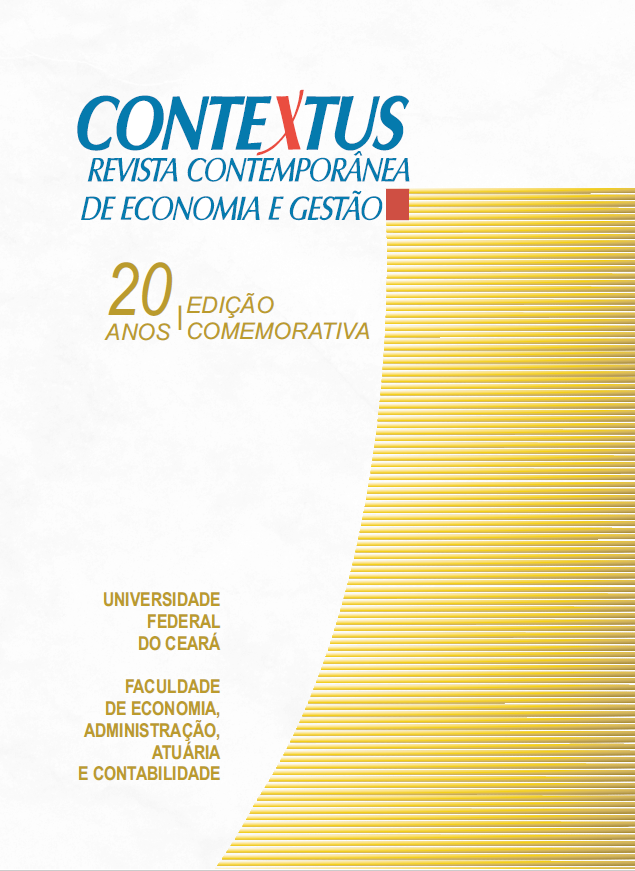Discourse analysis as a research strategy in the field of Administration: An overview
DOI:
https://doi.org/10.19094/contextus.2023.88619Keywords:
discourse analysis, organizational studies, research strategy, administration, theoretical essayAbstract
This paper develops a reflection on Discourse Analysis (DA), which has had an increasingly meaningful role in the field of organizational studies, especially in administration. It begins with the presentation of the DA main streams, a methodological division which delimits distinct orientations both in the theoretical and practical fields. It takes Saussure’s contributions as the starting point of the theoretical foundation. After that, the theories of speech acts, or pragmatics, as well as the theories of enunciation and the concept of destination are briefly explored, as a way to establish a background to guide the reader and allow him/ her to understand the urge to submit the discourse of administration to the indiscreet DA lenses.
References
Alvenson, M., & Deetz, S. (1996). Critical theory and postmodernism approaches to organizational studies. In S. Clegg, C. Hardy & W. Nord (Eds), Handbook of organization studies (pp. 191-217). London: Sage.
Ballalai, R. (1989). Notas e subsídios para a análise do discurso: uma contribuição à leitura do discurso da administração. Fórum Educacional, 13(1-2), p. 56-80.
Bourdieu, P. (1983). Esboço de uma teoria prática. In R. Ortiz (Org.), Pierre Bourdieu: sociologia (pp. 46-81). São Paulo: Ática.
Bryman, A. (1992). Research methods and organization studies. 2. ed. London: Routledge.
Carvalho, C. (1984). Para compreender Saussure. 4. ed. Rio de Janeiro: Editora Rio.
Daudi, P. (1986). Power in the organisation: the discourse of power in managerial praxis. Oxford: Basil Blackwell.
Feynman, R. (1976). Los Alamos from below. Engineering and Science, 39, 28-43.
Foucault, M. (1966). Les Mots et les Choses. Paris: Gallimard.
Foucault, M. (1969). L’Archéologie du Savoir. Paris: Gallimard.
Gadet, F. (1982). L’analyse de discourse et l’ “interprétation”. Drlva, 27, 107-133.
Gitlin, T. (1989). Postmodernism: roots and politics. In I. Angus & S. Jhally (Eds.), Cultural politics in contemporary America (pp. 347-360). New York: Routledge.
Hardy, C., & Clegg, S. (1996). Some dare call it power. In S. Clegg, C. Hardy & W. Nord (Eds.), Handbook of organization studies (pp. 622-641). London: Sage.
Hjemslev, L. (1966). Le 0langage. Paris: Minuit.
Hofstede, G. (1980). Culture’s consequences: international differences in work-related values. London: Sage.
Jenkins, R. (1992). Pierre Bourdieu. London: Routledge.
Knights, D., & Morgan, G. (1991). Strategic discourse and subjectivity: towards a critical analysis of corporate strategy in organizations. Organization Studies, 12(2), 251-73.
Linstead, S. (1994). Deconstruction in the study of organizations. In J. Hassard & M. Parker (Eds.), Postmodernism and organizations (pp. 49-70). 2. ed. London: Sage.
Maingueneau, D. (1997). Novas tendências em análise do discurso. 3. ed. Campinas: Pontes.
Martin, J., & Frost, P. (1996). The organizational culture war games: a struggle for intellectual dominance. In S. Clegg, C. Hardy & W. Nord (Eds.), Handbook of organization studies (pp. 599-621). London: Sage.
Meyer, M. (1982). Logique, langage, et argumentation. Paris: Hachette.
Molinas, A. (1991). A modernidade, a análise do discurso e a dispersão do sujeito. Letras de Hoje, 84(1), 20-60.
Pêcheux, M. (1984). Sur les contextes épistémologiques de l’analyse de discours. Mots. Les Langages du Politique, 9, 7-17.
Pereira, A. (1991). Uma introdução à análise do discurso. Letras de Hoje, 84(1), 7-20.
Reed, M. (1996). Organizational theorizing: a historically contested terrain. In S. Clegg, C. Hardy & W. Nord (Eds.), Handbook of organization studies (pp. 31-56). London: Sage.
Saussure, F. (1968). Cours de Linguistique Générale. Paris: Payot.
Saussure, F. (1987). Curso de linguística geral. 13. ed. São Paulo: Cultrix.
Whipp, R. (1996). Creative deconstruction: strategy and organizations. In S. Clegg, C. Hardy & W. Nord (Eds.), Handbook of organization studies (pp. 261-275). London: Sage.
Downloads
Published
How to Cite
Issue
Section
License
Copyright (c) 2023 Journal: only for the 1st publication

This work is licensed under a Creative Commons Attribution-NonCommercial 4.0 International License.
The authors, while doing the submission, accept the notice below:
We authors hold the copyright related to our paper and transfer Contextus journal the right for the first publication with a Creative Commons’ international license of the modality Attribution – Non-commercial 4.0, which in turn allows the paper to be shared providing that both the authorship and the journal’s right for initial release are acknowledged.
Furthermore, we are aware of our permission to take part in additional contracts independently for non-exclusive distribution of the version of our work published in this journal (e.g. publishing it in an institutional repository or as a book chapter), while acknowledging both the authorship and the journal’s initial publication.
We also certify that the paper is original and up to this date has not been released in any other journal, Brazilian or of another nationality, either in Portuguese or another language, as well as it has not been sent for simultaneous publication in other journals.
Last, we not only know that plagiarism is not tolerated by Contextus but also certify the paper presents the sources of passages from cited works, including those authored by ourselves.









3.png)


1.jpg)



1.jpg)


1.jpg)






.jpg)



1.jpg)

1.jpg)


1.jpg)

1.jpg)
1.jpg)
2.png)




1.jpg)
2.jpg)

1.jpg)





1.jpg)


1.jpg)
1.jpg)
